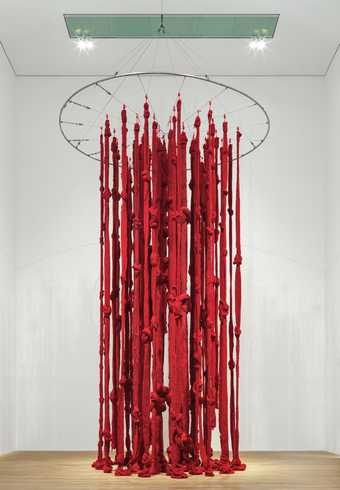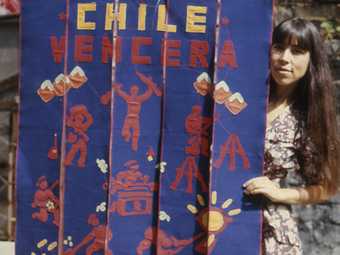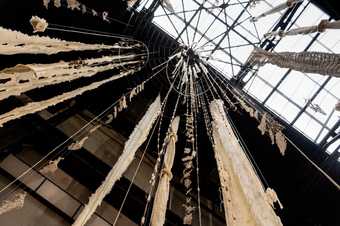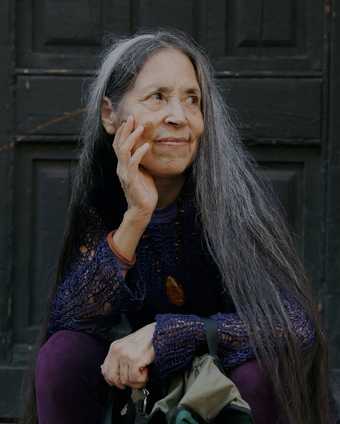The Earth is a brain forest, and the quipu embraces all its interconnections.
Cecilia Vicuña
Cecilia Vicuña's Brain Forest Quipu Calls-to-action
Find out more about the artist's work and action against climate change
Hyundai Commission: Cecilia Vicuna: Brain Forest Quipu amplifies the voices of Indigenous people who are directly impacted by climate change. She calls on us to respond with action: "we must hold international banks and mining companies accountable to the destruction they are causing, we must listen to the voices of Indigenous women, and we must protest threats to the survival of activists".
Brain Forest Quipu is a multi-part work by Vicuña conceived as four quipus in one. In addition to the sculpture-based Dead Forest Quipu and the Sound Quipu, there is the Digital Quipu and the Quipu of Encounters. In the Digital Quipu Vicuña has brought together videos of Indigenous activists and land defenders from regions around the world who are using digital platforms to amplify their calls, and in the Quipu of Encounters she invites us to become active participants in the prevention of climate catastrophe.
Below you can see the videos made by 7 organisations that Vicuña supports and learn more about how we too can participate in the fight against climate change through the Quipu of Encounters.
Digital Quipu
Amazon Watch
Amazon Watch is a nonprofit organization founded in 1996 to protect the rainforest and advance the rights of Indigenous peoples in the Amazon Basin. They partner with Indigenous and environmental organizations in campaigns for human rights, corporate accountability and the preservation of the Amazon’s ecological systems.The Articulation of Indigenous Peoples of Brazil (APIB) is an Indigenous-led regional umbrella organisation that aims to strengthen the Indigenous peoples unity across different regions and Indigenous organisations in Brazil.
These videos report on how mining companies and their networks of international investors drive Indigenous rights violations and threaten the future of the Amazon. They also look at the Bolsonaro government’s weakening of environmental protection laws and specific legislative changes including the 191/2020 bill which makes Indigenous territories more vulnerable to industrial and wildcat mining.
Indigenous activists interviewed in the first video include: Alessandra Munduruku (Munduruku leader, activist, and Coordinator of the Association Pariri of the Middle Tapajós), Bep Mairi Xikrin (Xikrin Chief); Lorena Kuruaya (student and activist); Idglan Pereira (Resident of Vila da Ressaca); and Tuíre Kayapo (Kayapó leader, warrior, and activist);
And in the second video: Alessandra Korap Munduruku (Munduruku leader, activist, and Coordinator of the Association Pariri of the Middle Tapajós), and Tuíre Kayapó (Kayapó leader, warrior, and activist).
Survival International
Survival International is a human rights organisation formed in 1969 in London that campaigns for the rights of indigenous and/or tribal peoples and uncontacted peoples. The organisation's campaigns focus on Indigenous peoples' desires to keep their ancestral lands.
In these videos, indigenous activists including Olimpio Santos Wiramu Guajajara, a “Guajajara Guardian,” from Guajajara tribe in Brazil's Maranhãoone state are interviewed. Olimpio is one of many Indigenous defenders of the Amazon who are risking their lives to defend and protect their territories and resources in the fight against illegal loggers and other invaders. In this interview he calls on the international public to “defend life and the lungs of the earth.” Also hear from Ninawa Huni Kui of the Huni Kui people of Brazil, Celia Xakriabá of the Xakriabá people of Brazil, Elias Kimaiyo of the Sengwer people of Kenya, Dayamani Barla and Anoushka Shankar who is advocating for the Adivasi people of India.
KESAN
The Karen Environmental and Social Action Network (KESAN) is the first wholly Karen indigenous organisation to address social and environmental problems that the Indigenous people in Karen State of Burma have faced over many decades, exacerbated by the violence and inequities of more than 60 years of civil war.
This video centers on Indigenous communities in Myanmar (including Indigenous Karen peoples), who have created their own community conservation areas to protect their land, forest and territories from threats. It highlights the central role that Indigenous communities play in forest management biodiversity protection around the globe.
Global Witness
Global Witness hold companies and governments accountable for their destruction of the environment and their failure to protect human rights through investigative campaigns that report and track threats to the survival and safety of land defenders.
These videos spotlight the activism of Marivic ‘Tarsula’ Danyan, a T'boli indigenous rights defender from the Phillipines; Ramon Bedoya from Colombia; and Maria do Socorro da Silva from Brazil who are exposing the negative health impact a nearby alumina plant is having on their community.
They also share the experiences of environmental activists Malungelo Xhakaza and Claudelice Silva dos Santos whose families were murdered in their struggle to protect their land.
Project Sepik / Save the Sepik
The Save the Sepik campaign is an Indigenous-led campaign of Project Sepik which is fighting to protect the Sepik River in Papua New Guinea from the development of the Frieda River Mine.
In this video Project Sepik founder Emmanuel Peni, an Indigenous land defender and LGBTQ+ activist from Papua New Guinea calls for the banning of the Frieda River mine which is funded by PanAust.
If Not Us Then Who?
If Not Us Then Who aims to build lasting networks, target unjust policies, and advocate for greater rights for Indigenous and local peoples to bring about positive social change. They work in partnership with communities to make films, take photographs, curate content, commission local artists and host events.
In these videos, Joseph Itongwa (Walikale), Kapupu Diwa Mutimanwa (Twa), Marie Lisenga, and Jean Rene Marie Nzape Ndombe of the ‘Pygmy’ communities in the Democratic Republic of Congo discuss the racism and prejudice endured for decades in the face of ongoing exploitation of their land by international companies. We also hear from Sapara land defenders in Ecuador, Yanda Montahuano, Manari Ushigua, Gloria Ushigua, Maria Ushigua, and Nema Grefa, alongside Benito Bonilla from the Pachamama Foundation, and Felipe Bonilla from Acción Ecológica who are working tirelessly to resist oil concessions in their territory.
Indigenous Climate Action
Indigenous Climate Action (ICA) is an Indigenous-led organization guided by a diverse group of Indigenous knowledge keepers, water protectors and land defenders from communities and regions across the country of known as Canada.
In this video Ta'Kaiya Blaney (Tla'Amin First Nation) makes a plea to global leaders attending COP25, while a representative of the Cuna peoples communicates the urgency of such demands.
Quipu of Encouters
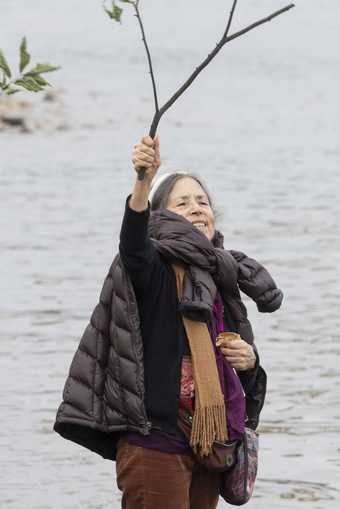
Copyright: Sonal Bakrania and Matt Greedwood
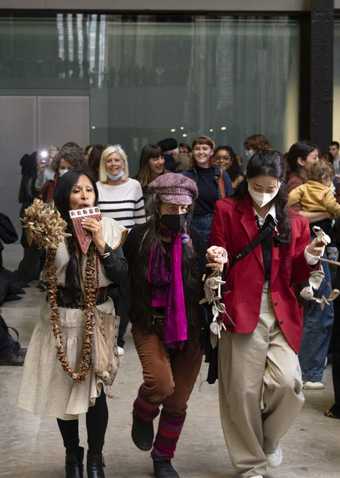
Copyright: Sonal Bakrania and Matt Greedwood
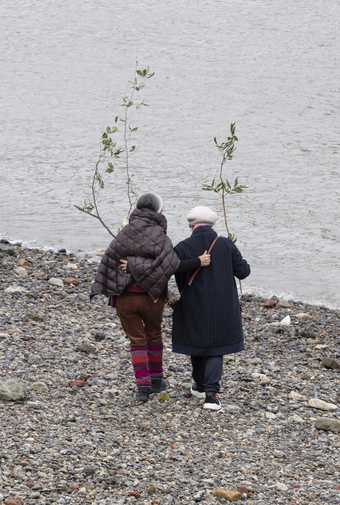
Copyright: Sonal Bakrania and Matt Greedwood
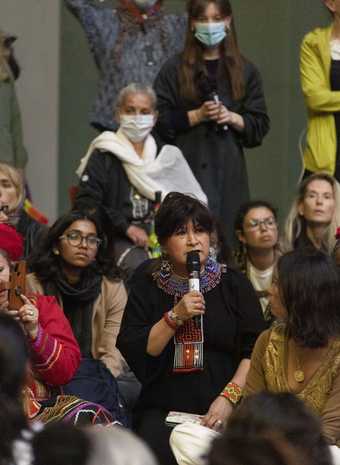
Copyright: Sonal Bakrania and Matt Greedwood
As part of Vicuña’s project she created the ‘Quipu of Encounters: Rituals and Assemblies’. It is a series of international events, or ‘knots of action’, uniting people in the poetic and political protection of our planet.
The first event took place at Tate Modern on the 14th October 2022. Members of the public were invited to gather in the Turbine Hall alongside environmental activists, artists, scientists, poets and musicians committed to the defence of vital ecosystems and indigenous communities around the world. Vicuña led the group in a participatory ritual which mourned the loss of the forest and gave thanks to the river Thames, encouraging visitors to become active in the prevention of climate catastrophe.
What can we do?
Call to Action
Quipu of Encounters is an invitation to experiment with new forms of communication and exchange, building on histories of collective action.
Rejecting the capitalist system which individualises and separates, and is incompatible with ecological sustainability, Vicuña encourages us to reflect on our place in a grander scheme, celebrating our relation to each other and the earth. As she explains, ‘the Turbine Hall demands a different scale – of the imagination, not just for the sculpture. It is [a space] for us to imagine a different kind of being in the world, a different kind of society, different kinds of connectivity and relations to each other.’
The recognition and protection of Indigenous Lands remains one of the most effective tools for effectively combating deforestation. The Amazon rainforest is one of the world’s most biodiverse regions. It also plays a key role in regulating the global climate. For generations, Indigenous Peoples have lived sustainably in the forest, developing and deploying agricultural techniques that protect and nurture the ecosystem. Protecting the rights of Indigenous Peoples and their land will lead us toward more sustainable practices, protecting everyone’s future.
Cecilia Vicuña invites us to amplify the voices of Indigenous people around the world by staging our own events actions. She encourages us to embrace the power of the quipu, using the hashtag #QuipuOfEncounters and #BrainForestQuipu to begin to form a global support network.
In partnership with Hyundai Motor.

